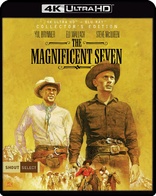The Magnificent Seven 4K Blu-ray Movie
HomeThe Magnificent Seven 4K Blu-ray Movie 
4K Ultra HD + Blu-rayShout Factory | 1960 | 128 min | Not rated | Feb 21, 2023
Movie rating
7.7 | / 10 |
Blu-ray rating
| Users | 3.8 | |
| Reviewer | 4.5 | |
| Overall | 3.8 |
Overview
The Magnificent Seven 4K (1960)
A bandit terrorizes a small Mexican farming village each year. Several of the village elders send three of the farmers into the United States to search for gunmen to defend them. They end up with 7, each of whom comes for a different reason. They must prepare the town to repulse an army of over 100 bandits who will arrive wanting food.
Starring: Yul Brynner, Eli Wallach, Steve McQueen (I), Charles Bronson, Robert VaughnDirector: John Sturges
| Western | Uncertain |
| Drama | Uncertain |
| Adventure | Uncertain |
| Action | Uncertain |
| Thriller | Uncertain |
Specifications
Video
Video codec: HEVC / H.265
Video resolution: 4K (2160p)
Aspect ratio: 2.35:1
Original aspect ratio: 2.35:1
Audio
English: DTS-HD Master Audio 2.0 Mono (48kHz, 24-bit)
English: DTS-HD Master Audio 5.1 (48kHz, 24-bit)
English: DTS-HD Master Audio 2.0 (48kHz, 24-bit)
English DD 2.0 is commentary!
Subtitles
English SDH
Discs
Blu-ray Disc
Two-disc set (2 BDs)
4K Ultra HD
Packaging
Slipcover in original pressing
Playback
Region A (locked)
Review
Rating summary
| Movie | 4.5 | |
| Video | 4.0 | |
| Audio | 4.5 | |
| Extras | 3.5 | |
| Overall | 4.5 |
The Magnificent Seven 4K Blu-ray Movie Review
Reviewed by Dr. Stephen Larson February 15, 2023Thirteen years ago, Casey Broadwater reviewed John Sturgis's Western classic The Magnificent Seven (1960) as part of MGM's four-disc The Magnificent Seven Collection. For thoughts and analysis of the original film and the three sequels, please refer to Casey's review.
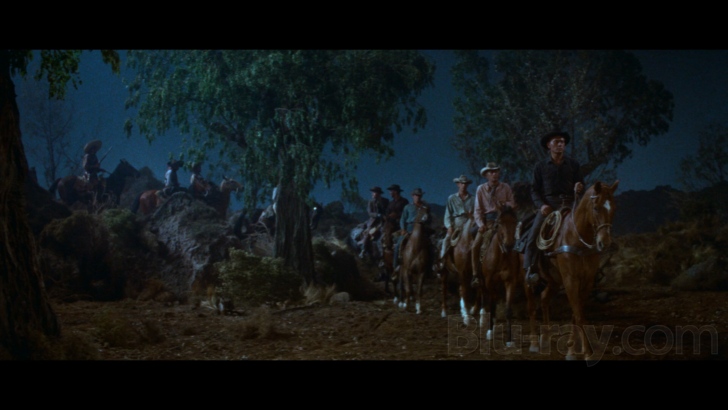
The Seven ride in.
The Magnificent Seven 4K Blu-ray Movie, Video Quality 

Shout Select's "Collector's Edition" package, which comes with a slipcover, includes a BD-100 for the Dolby Vision (HDR10-compatible) presentation on the first disc and a BD-50 (disc size: 45.22 GB) for the Blu-ray transfer on the second. Shout advertises both as deriving from a "2022 restoration and color grade using an existing 4K scan of the original camera negative." The picture appears in its original theatrical exhibition ratio of 2.35:1. The most outstanding element popping out from this new transfer, aside from the enhanced clarity courtesy of the DV/HDR, is how wonderfully balanced the grain structure is sans any stability issues in the image. During reel changes and scenic transitions, there are moments where there is coarser grain to go along with fluctuations in color temperature (before a fade or dissolve, for example) but these were present from the first DVD I viewed of The Magnificent Seven in the early 2000s. The reds are deeper and richer here than they are on the 2010 1080p transfer. The difference is noticeable over the main titles in the 2022 transfer in which the red letters are brighter. In Screenshot #s 15-26, I've created several set of frame matches between the MGM and Shout transfers. In frame grab #16, you'll see how the curtains are crimson compared to the lighter red in #15. There are also some conspicuous discrepancies in the color schemes. For instance, the signage and posts in front of the drugstore in capture #24 is turquoise compared to the dark gray in capture #23. In addition, the sky casts a lighter blue in #22 than the darker hue in #21. It seems that the Shout is probably more accurate since the shot was taken in bright and broad daylight. On the UHD, background clarity is excellent in the shot of Calvera and his banditos galloping towards the Mexican village (frame grab #26). The only damage mark I later spotted is a light scratch in the top right above Vin Tanner (Steve McQueen; see capture #2). I didn't initially notice this in motion. On the Blu-ray, Shout encodes the main feature at a mean video bitrate of 31997 kbps.
Screenshots 1-14, 16, 18, 20, 22, 24, & 26 = 2022 Restoration and Color Grade (Shout Select)
Screenshots 15, 17, 19, 21, 23, & 25 = 2010 Restoration and Color Grade (MGM)
The standard twelve chapters accompany the 128-minute feature.
The Magnificent Seven 4K Blu-ray Movie, Audio Quality 
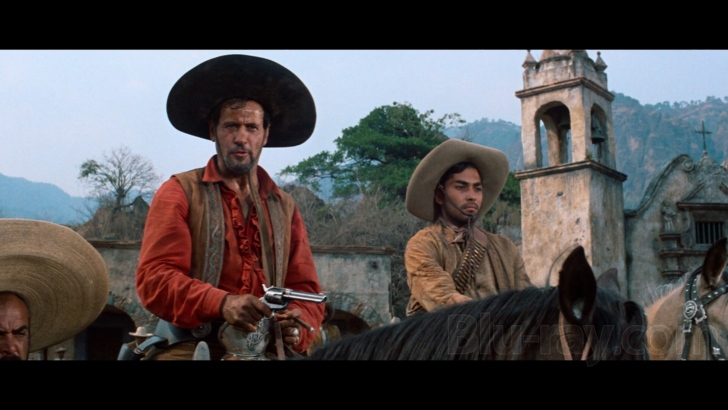
Shout has supplied a DTS-HD Master Audio Dual Mono mix (1801 kbps, 24-bit), a DTS-HD Master Audio 5.1 Surround remix (3558 kbps, 24-bit), and a DTS-HD Master Audio Stereo track (1974 kbps, 24-bit). I first listened to the 5.1 track and essentially, the only activity I heard along the rears is Elmer Bernstein's rousing theme that plays during the main titles and in various iterations throughout the movie. At first, I had some difficulty fully hearing Yul Brynner and Steve McQueen's first bits of dialogue. I would advise playing the film in either stereo or the original monaural mix. Thankfully, audible hiss is completely absent. There are no pops, crackles, or dropouts on the lossless tracks.
Late last year, Spain-based soundtrack label Quartet Records released an expanded edition of Bernstein's classic score along with the three sequel scores the maestro wrote. QR accessed three 1/4″ full-track monaural rolls of "print" takes in the MGM vaults. Album restorer and producer Chris Malone wrote in a Film Score Monthly thread for this release that all audio content (i.e., instrumentation) plays in both the left and right channels. (Another reason to play the uncompressed mono track on the Shout discs.) It can't be overstated how important it is to still have the original master tapes because for over three decades, they were considered lost. Indeed, Bernstein was unaware of their existence so, along with Christopher Palmer, he reconstructed and edited his score for a 1993 re-recording that was conducted by James Sedares and performed by the Phoenix Symphony. (The US record label KOCH International Classics put it out on CD a year later.) Bernstein wrote in the packaging: "The first recording of the entire score...the definitive interpretation in my opinion." Palmer scaled back the first claim a bit in the liner notes: "...it is fair to say that between about 92% and 95% of the complete score is represented here." Palmer explained why he deemed the original recording lost: "United Artists, a company which owned no studio as such nor, therefore, any music library to serve as repository for its scores. As often happened in these circumstances, the original orchestral scores were lost or destroyed." Palmer and Bernstein relied on the latter's detailed sketches to reassemble the original orchestrations. In April 1997, Bernstein traveled to the City Halls in Glasgow, Scotland to conduct his score, which was performed by the Royal Scottish National Orchestra. (Bernstein and record producer Robert Townson helped prep it for CD with RCA Victor handling distribution.) Then a year later, a major discovery occurred with the discovery of the master tapes. The Warner label Rykodisc mastered Bernstein's 1960 recording on a High Definition Compatible Digital (HDCD), which was produced by Pacific Microsonics. In the liner notes, film music historian Jeff Bond cited this release as a landmark: "[T]his album offers the first chance to hear the original recording actually used in the film." Apparently, Bernstein was too busy in 1998 with other projects to work on the release so Emilie A. Bernstein (Elmer's daughter) produced the album on her father's behalf. (In 2004, Varèse Sarabande reissued the Ryko album.) In 2015, European label Soundtrack Factory remastered Bernstein's score in a 24-bit recording with outstanding fidelity. The 2022 Quartet album contains ten additional tracks not present on the other releases.
Shout has provided optional English SDH for the feature on the 4K and Blu-ray discs.
The Magnificent Seven 4K Blu-ray Movie, Special Features and Extras 
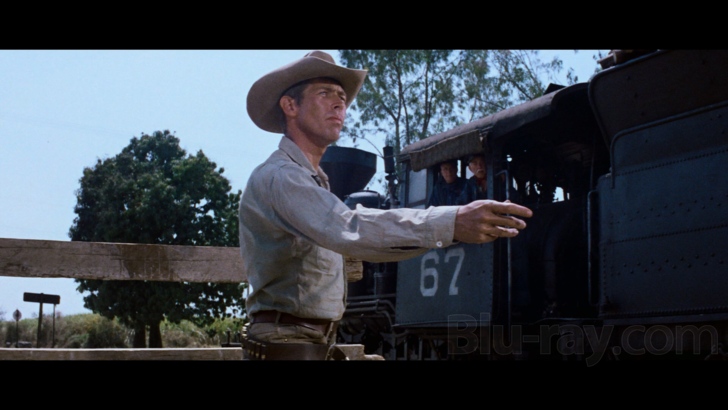
DISC ONE: 4K UHD
- Commentary by Film Historian Sir Christopher Frayling - this feature-length commentary track originally appeared on the first of a two-disc "Collectors Edition" in 2006. Because Sony also was involved in that release along with MGM, I'm surmising that there was a licensing issue in getting it ported over to MGM's box set and individual release in 2010/11. Frayling begins by discussing the musical structure of Elmer Bernstein's score. He covers each of the major cast principals, placing The Magnificent Seven in the wider context of their careers. Frayling gives special recognition to John Sturges's directorial talents, which he claims are largely unrecognized. Frayling also talks about other Westerns and how this film compares to them. In English, not subtitled.
- Commentary by James Coburn, Eli Wallach, Producer Walter Mirisch, and Assistant Director Robert Relyea - this feature-length track was originally recorded for MGM's "Special Edition" DVD in 2001. Mirisch, Relyea, Wallach, and Coburn all appear to have been recorded together. You can distinctly hear each voice come out of either the left or right front speaker. The participants come prepared with several stories about Sturges, which are a delight to listen to. There are several gaps throughout, which would have been mitigated with the presence of a moderator. All speak in English, not subtitled.
DISC TWO: Blu-ray
- Commentary by Film Historian Sir Christopher Frayling - Same track as Disc One. See details above.
- Commentary by James Coburn, Eli Wallach, Producer Walter Mirisch, and Assistant Director Robert Relyea - Same track as Disc One. See details above.
- Sir Christopher Frayling on The Magnificent Seven (20:22, upconverted to 1080p) - this interview/video essay with Frayling was initially produced by Sony for MGM's 2006 "Collector's Edition" DVD. Like the commentary track with the film historian, this also was left off the BDs MGM released around the globe in 2010/11. Frayling discusses how influential The Magnificent Seven was on other films in the Western genre and its locus in Western film culture during the late 1950s/early 1960s. He points out how underrated John Sturges was as a director, his efficiency as an action filmmaker, and his knack for casting actors in the right roles. Frayling also talks about how Eli Wallach changed perceptions of the bandido, the strengths and weaknesses of Yul Brynner's acting in the picture, some alternative views of Steve McQueen's on-screen persona, Horst Buchholz and his love interest in the film, and the movie's other supporting actors. Additionally, Frayling describes the role William Roberts's comedic dialogue plays. In English, not subtitled.
- Guns For Hire: The Making of The Magnificent Seven (46:55, upconverted to 1080p) - this is as much an appreciation of Sturges's classic Western than it is a making-of doc. This retrospective program produced by MGM Home Entertainment in 2000 features interviews with actors James Coburn, Horst Buchholz, Eli Wallach, Robert Vaughn, Rosenda Monteros, John Alonzo, and Brad Dexter. At least two different interviews with Yul Brynner are excerpted, with footage shown in 1.33:1. We also hear from several of the movie's crew members: associate producer Lou Morheim, screenwriter Walter Bernstein, executive producer Walter Mirisch, and composer Elmer Bernstein. Also contributing remarks are Doris Kleiner, former wife of Yul Brynner, and Neile Adams, former wife of Steve McQueen who was on location in Mexico during filming. This doc has quiet a bit of information on what went on during pre-production. For example, Brynner and Martin Ritt were each attached to direct. Anthony Quinn also was tapped to star at one point. The program explains the myriad changes the script underwent by three writers. The other parts of the doc are devoted to the movie's legacy. We hear from actor Chazz Palminteri as well as directors John Carpenter and Lawrence Kasdan. All interviewees speak in English except for Monteros, whose Spanish is dubbed into English by Maria Palacios de Erickson. The doc isn't subtitled.
- Elmer Bernstein and The Magnificent Seven (14:49, 480i) - Film music historian Jon Burlingame critiques a number of cues that Bernstein composed, which are titled and scored during the scenes for which they were written for. Burlingame does a fine job of identifying the main themes and secondary themes as well as explaining the context in which they reappear throughout the score. In English, not subtitled.
- The Linen Book: Lost Images from The Magnificent Seven (14:49, 480i) - Maggie Adams, head of MGM Home Entertainment's photo archive, describes the discovery of a vintage linen book that documented the production of The Magnificent Seven. Assistant Director Robert Relyea and co-star Eli Wallach examine several of the photos and share their memories of the shoot. Wallach had an especially good memory as he tells detailed anecdotes about his collaborators. In English, not subtitled.
- Original Theatrical Trailers (5:52, upconverted to 1080p) - two trailers for The Magnificent Seven, each presented in 2.35:1 anamorphic widescreen. The first is a vintage trailer that hasn't been restored. The second looks like it was packaged for one of the film's re-releases and has been mostly restored. The voice-over has a more "modern" sound to it and may have been recorded years after the original theatrical release.
- Still Gallery (4:09, 1080p) - a slide show comprising forty-eight distinct images from The Magnificent Seven's shoot and ad campaign. These contain some stills of different posters printed in newspapers and the trades. A majority of the stills are publicity snapshots (all in black and white) of the actors who form the Magnificent Seven as well as some of Eli Wallach. There are also several photos of the actors eating during breaks and playing cards together. This is the same collection of images as the "Production Stills" gallery on the R1 MGM "Special Edition" and the MGM BDs. Two galleries missing which appeared on the 2006 CE are "Portrait Art" and "Classic Production Art."
The Magnificent Seven 4K Blu-ray Movie, Overall Score and Recommendation 
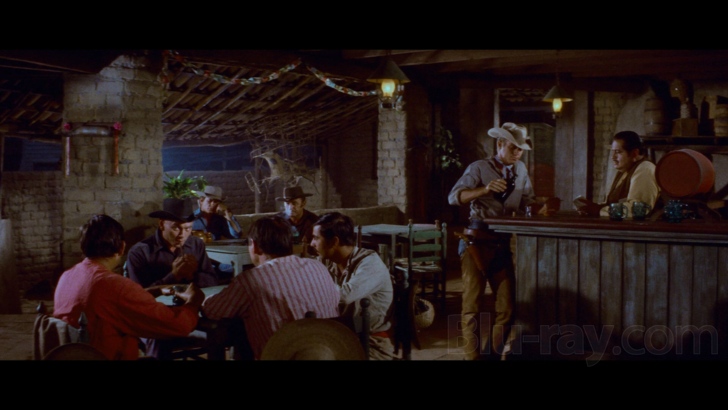
Shout Select's forthcoming UHD/BD combo of The Magnificent Seven is a welcome surprise, with the 4K presentation the best way to experience this landmark Western. I think MGM did a fine job with the new color grading. Supplements duplicate the prior DVDs and BDs with only a couple of photo galleries missing from a CE. It's a big plus to have Frayling's audio commentary and video essay back. There aren't any new extras but the 2001 retrospective doc remains a highly informative piece on the film's creation. If you enjoyed Kino Lorber's 4K UHD edition of Sturges's The Great Escape last year, you're sure to be pleased with Shout's presentation as well. VERY HIGHLY RECOMMENDED.
Other editions
The Magnificent Seven: Other Editions

The Magnificent Seven
1960

The Magnificent Seven
MGM 90th Anniversary
1960

The Magnificent Seven 4K
1960

The Magnificent Seven 4K
1960
Similar titles
Similar titles you might also like

Guns of the Magnificent Seven
1969

The Wild Bunch
1969

A Fistful of Dollars 4K
Per un Pugno di Dollari
1964

Broken Trail
2006

The Last Rites of Ransom Pride
2010

Pat Garrett and Billy the Kid 4K
50th Anniversary Release (4K/BD), Original Theatrical Release (4K/BD), and Final Preview Cut (BD)
1973

The Professionals
1966

Jane Got a Gun
2015

The Man Who Shot Liberty Valance 4K
1962

Lonely Are the Brave
1962

Buchanan Rides Alone 4K
1958

Return of the Seven
Return of the Magnificent Seven
1966

High Noon
4K Restoration
1952

Shane 4K
1953

One-Eyed Jacks
1961

Lonesome Dove
2-Disc Collector's Edition
1989

The Good, the Bad and the Ugly 4K
Il buono, il brutto, il cattivo
1966

Unforgiven 4K
1992

The Searchers 4K
Warner Archive Collection
1956

How the West Was Won
1962
